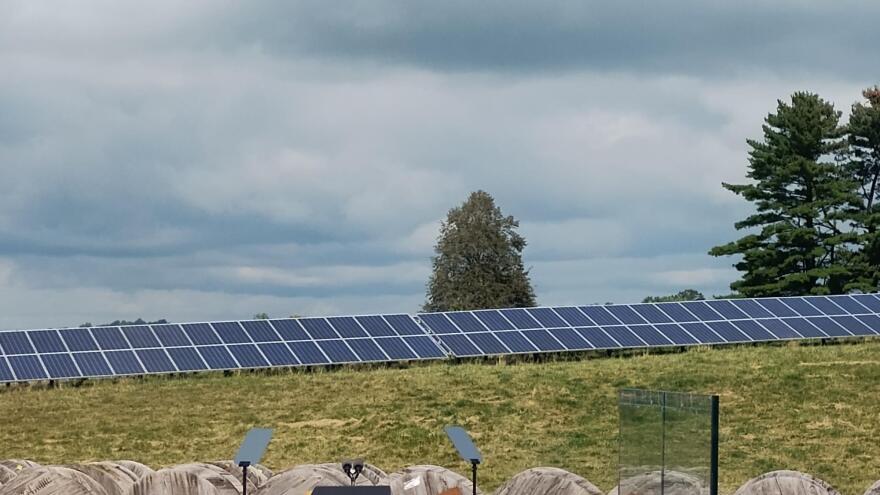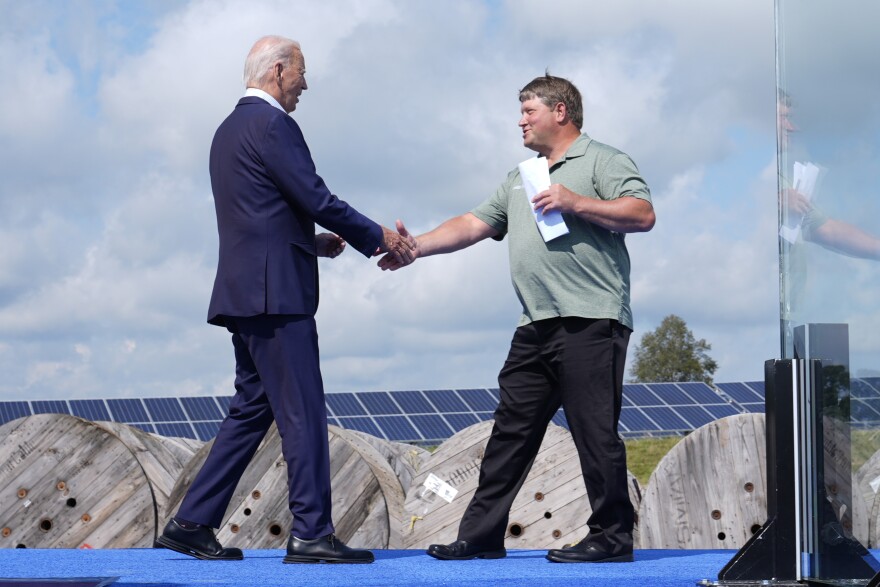Supporters of a new half-billion dollar federal financing package for a Wisconsin rural electric cooperative say there will be benefits across the entire state. President Joe Biden announced the funding on Sept. 5 near LaCrosse, WI.
Biden says the non-profit Dairyland Power Cooperative will receive $573 million in grants and loans to help fund what will be a $2 billion project. The LaCrosse-based utility promises to acquire more than 1,000 megawatts of renewable energy from four solar farms and four wind farms across Wisconsin, Minnesota, Iowa and Illinois. Dairyland will also build energy storage units to help distribute the electricity as needed.
The public money comes from the Inflation Reduction Act and is part of $7 billion in financing for 16 U.S. rural co-ops the White House just unveiled under the Empowering Rural America program.
While visiting a Dairyland partner, Vernon Electric Co-op, in Westby, Biden said it’s the biggest expansion of rural electrification since President Franklin Roosevelt and the New Deal.
“Before the New Deal, private companies refused to provide electricity to rural communities. As a result, one in 10 rural households—only one in 10— had electricity before FDR came to power. So, farmers had to organize electric co-ops to distribute electricity to their families and communities. But the co-ops are still non-profit. They don’t have the same resources that private utility companies have to modernize their energy infrastructure," Biden said.
But now, Biden says the co-ops can benefit from clean energy tax credits.

Jeremy Fisher of the Sierra Club says the program should lead to major cuts in air pollution, which would benefit rural and urban areas.
“Rural electric co-ops have actually been some of the slowest entities to transition away from high cost fossil fuels. And a lot of that is because they have outstanding debt in coal plants and gas plants. But also because they didn’t have access to clean energy. So, this program actually takes care of two pieces of that—both allows for new clean energy investments and helps pay down debt," Fisher says.
Dairyland Power President and CEO Brent Ridge says the renewable energy projects will help the utility reduce carbon dioxide emissions by 70% and deliver power to 240,000 homes—with a 42% saving in electric rates for members over ten years.
Solar and wind farms have come under some criticism for using land that might otherwise grow crops. But Ridge says as contracts are negotiated with farmers or smaller energy companies, he believes any loss can be limited.
“One of our key focuses is looking for land that is maybe not as productive otherwise. And then, we try to improve the land we do affect. And, this is an income stream for many farmers that otherwise might have to lose the farm or not have it be generational," Ridge says.

Vernon County organic dairy farmer Darin Von Ruden heads the Wisconsin Farmers Union, which represents 2,200 family farms. He also says there are ways to avoid crop loss.

“In southwest Wisconsin here, with the hillsides we have, there’s a lot of grazing that happens, and solar systems can be installed with grazing of pretty much every animal. It might be a little more expensive to get dairy cattle or beef cattle into that system. But certainly any ruminant animal can graze under solar systems pretty much anywhere in the world," Von Ruden says.
Von Ruden says another siting factor will be how close the solar and wind farms are to existing power lines. He says some of the power generated in rural areas will end up in urban areas.
"That’s reality. In my travels across Minnesota and South/North Dakota, all the wind turbines out there, all that energy is coming to Wisconsin and Illinois. It’s part of the process and where that (electrical) grid is at," he says.
But Von Ruden says rural areas like his will get their fair share of the electricity from this major expansion of renewable energy — announced in a battleground state two months before Democratic Vice President Kamala Harris is trying to win the election against Republican Donald Trump and be Biden’s successor in the White House.
The Wisconsin Republican Party says President Biden’s "return to Wisconsin was the comeback tour no one wanted." The GOP statement did not address the half-billion dollar help for a major utility or the thousands of construction jobs that Dairyland says will be created.


